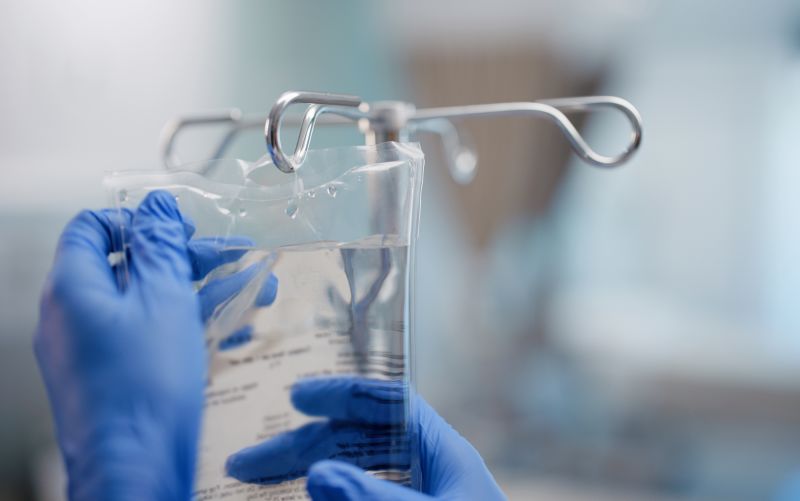Disruptions from Hurricane Helene exacerbated shortages of critical intravenous fluids in the United States, and now the Biden administration has invoked the wartime powers of the Defense Production Act in the latest move to help speed recovery efforts.
As the storm swept through western North Carolina last month, it severely affected operations at Baxter International’s North Cove production site, the largest manufacturer of IV fluids and dialysis solutions in the country. After a pause, Baxter resumed distribution of supplies – but with significant restrictions on the amount that could be ordered. Since last week, Baxter has expanded order capacity to up to 60% of typical volume for some of the most in-demand IV fluids.
But the strain persists. The US Food and Drug Administration has declared multiple shortages as a result, and hospitals have been rationing supplies – and postponing surgeries, in some cases – as the national supply chain continues to reel from the blow.
On Saturday, the US Centers for Disease Control and Prevention issued a health advisory about the shortages, warning health care providers that “the supply disruption may impact patient care and require adjustments to the clinical management of patients.”
Last week, the FDA announced that it is allowing the importation of products from five facilities outside the US to help alleviate the shortfall. And other US manufacturers, B Braun Medical and ICU Medical, are ramping up production to help fill the gaps.
But Baxter’s North Cove facility is a critical part of the supply chain; it typically produces about 60% of the IV fluids for hospitals across the country.
The US Department of Health and Human Services has now invoked the Defense Production Act to help Baxter obtain materials to clean and rebuild. Under the authorities of the law, Baxter will have priority access to a particular material needed to continue the remediation process and prepare for the restart of production. HHS’s Administration for Strategic Preparedness and Response is working with Baxter to identify other challenges and will pursue other opportunities to make use of the Defense Production Act, an agency spokesperson said.
“Ensuring people have medical supplies they need is a top priority of the Administration. It’s exactly why we are working closely with Baxter to support cleanup and restoration of the facility, including invoking the Defense Production Act to help production resume as quickly as possible,” an HHS official said in a statement Tuesday.
The Defense Production Act was passed in 1950 in response to the Korean War. The law gives the government – particularly the president – more authority to direct resources for industrial production during emergencies.
It was used during the Covid-19 pandemic by the Biden and Trump administrations to bolster production of supplies used in response efforts, including vaccines and ventilators. It was part of recovery efforts after Hurricane Maria hit Puerto Rico in 2017, which also affected Baxter facilities and led to shortages of IV bags used to administer and dilute medications that lasted months.
In an update Monday, Baxter said there is “good progress on site cleanup and remediation” at the North Carolina location. A temporary rock bridge replaced one that was damaged by the storm, and a second bridge is being built to allow more product and equipment to come and go from the facility.
“Current priorities are completing deep cleaning of the facility, including floors and equipment, as well as assessing the status of all equipment and production lines,” the company said. It aims to restart production at the affected site by the end of the year, but it will happen in phases, and there is no definitive timeline on when production levels will be fully restored.
Allocations for IV solutions and nutrition products for children’s hospitals have been restored to full capacity, and some other IV solution products could return to full allocation by the end of the year, the company said.
- Sign up here to get The Results Are In with Dr. Sanjay Gupta every Friday from the CNN Health team.
The major disruptions to the IV fluid supply after Hurricane Helene are the latest in a string of challenges that have exposed vulnerabilities to the broader US supply chain.
There were a record number of drugs in active shortage in the US in the first three months of 2024, according to data from the American Society of Health-System Pharmacists and the University of Utah Drug Information Service. The situation has improved somewhat in recent months, but there have been at least 300 active shortages for the past year and a half.

